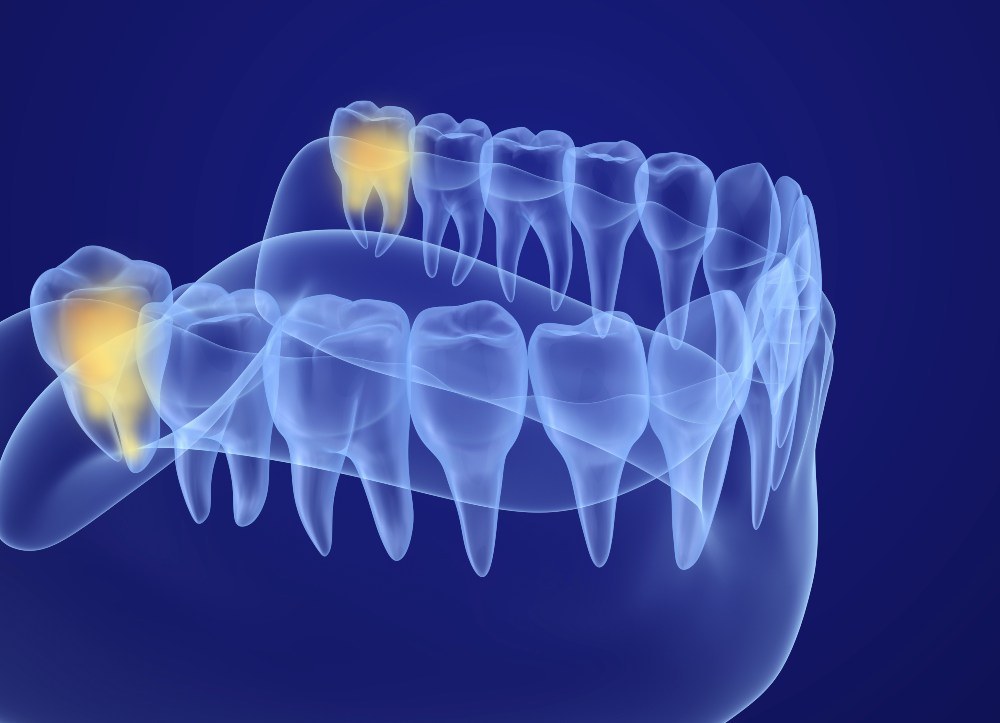
Everything You Needed To Know About Wisdom Teeth

Wisdom teeth: most of us will have them, but they are often considered a bit of a mystery - what are they and what purpose do they serve?
Wisdom teeth are the third set of molars that develop as you grow - normally in late adolescence (around 17 - 25) and their name reflects this transition from childhood when we supposedly become a little wiser.
Wisdom teeth reside in your jawbone and eventually grow large enough to break through the gumline completing your set of adult teeth.
These days, wisdom teeth are primarily vestigial - they serve little purpose as our eating habits have become more refined, but in the distant past they would have been used to break down the harder cuisine on offer such as tough raw meats that needed tearing and uncooked vegetation.
This diet would have also meant wisdom teeth acted as valued ‘back-up’ teeth due to the increased risk of tooth loss.
Here at Life Dental, we encounter many questions about wisdom teeth. There are too many to cover them all in this article but here are some of the more frequent concerns.
How long does wisdom tooth pain last?
Growing pains of wisdom teeth are very common, but the good news is that it should be a short-lived experience lasting only three to four days. Any major pain should dissipate on its own providing there are no complications such as impaction.
The slightly less good news is that the soreness does last somewhat longer, and you may experience discomfort for up to eight weeks. For this period frequent warm saltwater rinse and gentle, but focused tooth brushing at the affected site is recommended to keep the pain at bay.
Should wisdom teeth always be extracted?
The answer to that is a conditional ‘no’. Removal should be considered if they are impacted; painful; infected; likely to cause orthodontic issues such as becoming crowded; present a risk for tooth decay or gum disease; pressing on nerves, or you have a tumour or cyst in the region.
In the above scenarios, removing the teeth may also be a better option so do consult your dentist as to the best way forward.
In contrast, we recommend not removing the wisdom teeth if they have plenty of room, your overall health is good and they are causing no issues such as impaction.
Pain alone is not a reason for wisdom tooth removal, please consult your dentist for the best methods of relief.
How to treat swollen gums around the wisdom teeth
Pericoronitis is the name given to swelling and inflammation of the gum tissue, predominantly found around the wisdom teeth and formed when a wisdom tooth does not fully erupt or break through the gum line.
Soft tissue can then grow over the partially-erupted tooth called an operculum, and it is here that bacteria can get stuck. Once stuck it may then start to spread around the tooth creating infection and swelling.
Another way that pericoronitis occurs is if food, bacteria or plaque gets caught under the gingiva (the flap of gum around the tooth).
When this happens it is important to have it addressed promptly, in many cases the solution is an easy one, but nonetheless the faster these issues are sorted, the less of a problem they become.
Treatments include:
Better oral hygiene measures - rinsing the mouth with warm salt water, or using an oral irrigator to remove debris from below the gum line.
Painkillers such as ibuprofen or paracetamol may also be recommended
Antibiotics if there is swelling in the teeth, jaw or cheek.
Surgery to remove the operculum
Extraction may be the preferred option if the tooth is unable to form normally, and in this instance, both the higher and lower wisdom teeth are best to remove to prevent damage from a tooth biting on its opposing gum.
How long is the wisdom tooth removal recovery time?
If you and your dentist have decided to remove your wisdom teeth, what can you expect immediately after? Will it hurt? How do we help the process of healing along?
After extraction, the area does need to recover, in the case of normal healing this usually takes 3-4 days but in some cases, especially if the teeth are impacted, it can take a few days longer. If however, there are any complications such as hardened blood from the site breaking off, consult your dentist immediately!
The soreness itself will typically last between 7 – 10 days but there are things we can do to accelerate the healing process, Initially, rest and relaxation are essential and a great way to kick start the body’s natural healing responses.
As the healing continues, try to have some ice packs handy, these are very useful for swelling, inflammation and to lessen any discomfort.
If you do feel any pain, painkillers can also be a go-to option, and we can't stress enough the value of a warm saltwater rinse, this will clean the area and help to ward off potential infections.
Can I eat and drink normally after wisdom tooth removal?
Eating does need to be tailored in the initial stages of healing so as not to risk breaking the hardening blood from the site, soft food is strongly recommended and you will find with a little research that many soft foods still contain the required minerals and nutrients such as potassium, sodium and magnesium, as well as all your essential vitamins such as B12 and Vitamin D.
It is also very important that the body stays well hydrated in this time so please ensure to keep tabs on your water consumption and ensure it is at a good level.
Will wisdom tooth removal affect my leisure time?
As for day-to-day living, smart choices will need to be made such as avoiding contact sports, but by taking the appropriate steps and allowing the area to properly heal you’ll be back to completely normal life in no time.
Conclusion
It can be concerning when you feel pain or discomfort in an area that you cannot really see. Often these things are easily manageable and just a matter of time to completely correct.
With wisdom teeth especially, it is important to be vigilant and to have regular check-ups because they can start to misbehave without us ever being aware. Your dentist will be able to spot these initial early signs and take preventative measures to ensure your teeth stay in good shape for a long time to come.
We hope in this article we have answered many of your pressing questions when considering wisdom tooth extraction and care.
For further advice or any other dental concerns, you may have, please feel free to contact us or book a consultation.
Wishing you good oral health.
About Us
Life Dental and Wellbeing is a leading Exeter dental practice in the heart of the city. Shaped through many years of training and high-level experience, our unique approach goes beyond just teeth, looking at how teeth can affect the health of the body and vice versa. This approach has been shown to better not just your oral health but your body in general.



